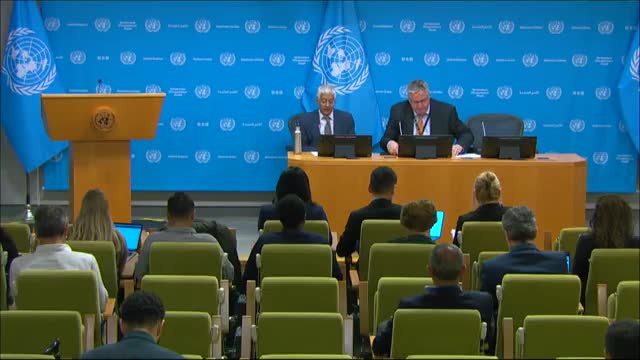UNFPA deputy director describes ‘dystopian’ devastation in Gaza, urges full humanitarian access and ceasefire
Get AI-powered insights, summaries, and transcripts
Subscribe
Summary
Andrew Saboten, UNFPA deputy executive director for management, told reporters after a visit to Gaza and the West Bank that hospitals and maternity services are largely damaged, women and newborns face acute shortages of care and supplies, and UNFPA needs sustained, unimpeded humanitarian access and donor funding to scale response and recovery.
Andrew Saboten, the deputy executive director for management at the United Nations Population Fund (UNFPA), said after a recent visit to Gaza and the West Bank that he saw “the sheer extent of the devastation” and called for a permanent ceasefire and full, sustained humanitarian access to reach women and girls in need.
Saboten said Gaza had been “flattened mile upon mile of rubble and dust,” and that UNFPA staff in Gaza had experienced deaths in their families and widespread home destruction while continuing to deliver services. “This is not collateral damage, and I cannot unsee what I have seen,” he said.
The trip, which Saboten described as his first to Palestine, focused on maternal health, protection services and psychosocial support. Saboten told reporters that Gaza’s health system is severely damaged and that urgent steps are needed so aid already staged at border crossings can enter and reach hospitals, maternity wards and community services.
UNFPA’s on-the-ground findings and needs
Saboten said approximately 94% of hospitals in Gaza are damaged or destroyed and that newborns and maternity care are under acute stress: premature and low-birth-weight infants now account for about 70% of newborns, and roughly one in three pregnancies is considered high risk. He said about 130 births occur each day across Gaza and that neonatal units are often overcrowded, with multiple newborns sharing a single incubator.
He described severe shortages of basic hygiene items and maternal supplies, noting that around 700,000 women and girls face menstrual hygiene challenges each month and that UNFPA has stockpiles — including incubators, delivery beds and fetal monitors — ready to enter Gaza but constrained by closed or restricted crossings. “We have in the region of 200,000 menstrual pads on the back of lorries stuck at borders,” Saboten said.
On wider population impacts, Saboten cited population and casualty figures to illustrate scale: Gaza’s population is about 2.1 million in roughly 140 square miles; various reports he referenced estimate about 70,000 people dead and about 250,000 dead or injured, which he said equals roughly 11% of the population. He emphasized malnutrition and lack of contraception and said those factors will have long-term generational effects.
Gender-based violence, mental health and community-led recovery
Saboten reported a sharp rise in gender-based violence and that UNFPA’s safe spaces have been damaged, moved or shuttered. He said the full spectrum of violence — including domestic violence and coping-driven increases in early child marriage — has been observed during the conflict and that psychosocial needs are widespread: he estimated up to 70% of Gaza’s young people are suffering depression or anxiety.
He stressed the role of local, women-led organizations and midwives in recovery and said UNFPA has doubled its implementing partners in Gaza since the crisis began. “Any build back of Gaza needs to be built from the bottom up,” Saboten said, urging support for community-based, women-led groups as part of reconstruction planning.
Staffing, access and funding constraints
UNFPA provided staffing figures for the Palestine country office: 57 staff in Palestine (7 international, 50 national) and 16 staff in Gaza (including four international staff). Saboten said he spent five days in the West Bank, Jerusalem and Gaza but was in Gaza for only one day because of crossing constraints and short-notice changes to movement plans.
He said UN humanitarian appeals remain underfunded — roughly one-third funded, he estimated — and noted recent reductions in some donor contributions, including a substantial U.S. funding pullback last year. Saboten said that while donors were stepping up, the volume of aid allowed in after the ceasefire was a “trickle” compared with needs.
What UNFPA is doing and asking for
Saboten said UNFPA has been distributing prepositioned medical equipment and supplies where possible and is planning immediate and medium-term recovery steps: renovating and equipping maternity hospitals, setting up emergency maternity facilities, deploying midwife networks, providing postpartum kits, and reopening safe spaces to prevent and respond to gender-based violence.
He said these plans depend on unimpeded, safe humanitarian access and predictable funding. “We desperately need to see a permanent ceasefire now because only once the bombings and the firing stop can we start on the very long road to recovery,” Saboten said.
Questions and documentation
Reporters pressed for specifics on visits and verifiable statistics. Saboten offered to provide additional documented statistics after the briefing, including more details on functioning health facilities and UNFPA’s staffing and partner networks. He repeatedly framed his observations as what he personally saw and heard from staff and partners on the ground and cautioned that his visit covered only part of Gaza and the West Bank.
Closing
Saboten concluded by urging the international community not to treat a ceasefire as an endpoint: he said recovery will be long and that immediate emergency response must be paired with plans to rebuild health, protection and social services led in large part by women and community-based organizations.
